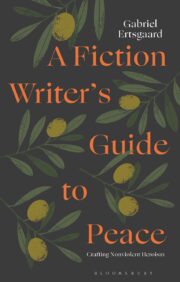THE INDIE FILES: Why Indie Writers Shouldn’t Be Afraid to Reach Out to the Big Names
by Noah Sturdevant
You write, right? You write books, novellas, poems, screenplays, comics, demented scribbles on the subway, etc. That makes you an author. Simple, isn’t it? It should be. But for some reason, we tend to forget our favorite authors are also humans.
That means John Scalzi is a cat-loving, church-owning human. Gail Simone is totally not a bear, despite her love of picnic baskets. George R.R. Martin is a human who we really all should stop bothering about release schedules. I’ve even heard whispers that Neil Gaiman is human, but the person who told me that was snatched by the Elvish Winter Court in the night and hasn’t been seen since.
I’m being silly, but I belabor the point because indie authors often treat the “big names” like an otherworldly caste that we dare not approach with our unclean and unworthy emails.
Guess what? You can approach them. And, in many cases, they might like or love it if you did.
Now that I’ve raised your expectations, let me lightly hit the brakes for a second. I’m talking about professional contact between authors and/or a connection between fellow authors. Again, the keyword is professional, which is hard to even talk about in the age of social media.
Speaking of social media, Facebook, Instagram, or the three rats and a toaster left on Twitter/X, are probably the best way to contact an author. They are most likely on it to promote their work and to interact with their readers. You should absolutely reach out to them there… respectfully. Don’t think you are best friends just because Felicia Day liked a picture of your adorable pet. Also, don’t spam them. For the love of (insert deity here), don’t spam them. Do unto others what wouldn’t annoy the bejeezus out of you.
With that out of the way, let’s say you want to contact the author for a professional reason. Most authors are probably cool with that. Just be realistic and don’t ask them to write a screenplay based on a dream you had once. In that case, you should only go through the channels they’ve established. If they have an email, you should use it. If they have a form for business, you should use that. If they screen things through a personal assistant, manager, or other person paid to deal with things, that’s who you talk to. Don’t go sniffing around for personal addresses or other malicious sneakiness. Anyone who tells you to be persistent and do whatever it takes to get that contact should be politely invited to go sit in a dumpster for a few weeks.
Maybe the person will say yes, or pass it up for approval, and then say yes. If so, congrats!
Or maybe they decline. Sadly, it’s time to talk about dealing with rejection.
Being rejected is part of life. Unless you are the author’s publisher, they don’t owe you anything. Yes, we are all in this business together, but that only goes so far. Don’t expect a royalty check from Kevin Hearne just because you are Facebook friends and he loves your breakfast taco recipe.
What do you do if you are rejected? Nothing. You move on. If you think your email went to spam, you might check once, and only once, to see that they got your proposal. That’s it. Be warm and gracious to those that take the time to reject you and either refocus on another person, or just move on. Rejection stings, but you’ll be fine.
There is one thing you can do to improve your odds, though. Be realistic with your expectations. What’s realistic? That will depend, but here are a few guidelines:
Realistic: Getting a like on social media if you post something funny or interesting. Maybe if you keep interacting, you can become social media (not the same as real) pals.
Worth a shot: Seeing if they’d like to contribute a story to an anthology. Note: you should either be prepared to pay a reasonable rate per word or be doing it for a charity they can support. Gail Simone (the not-bear) gently let me know my first choice of charity for a recent fundraiser was problematic. I quickly found one that suited the project much better.
Also worth a shot: Getting their work included in a bundle, especially if it’s something older that hasn’t had a lot of attention lately. This is also another area where you pay, split profits, or donate to charity.
You’re out of your mind: Getting them to write a book for you, or to be your co-author, just because you think you have a great idea.
Let me share my own project as a case study. During the height of Covid, I decided to try to get a charity anthology going.
On a whim, I contacted an author I admired and asked if he might be interested in joining me on the project. Then I contacted a whole lot more. At the same time, I worked with a group of authors I’m friends with (Hail, Team Twatwaffle) and also started looking for lesser-known authors to contribute.
To my surprise, many authors said yes. I won’t go into the names, but by stating what I was doing, why, and what I expected, I ended up with a lot of very clear responses. Not everyone was willing or able to help. That was fine. Again, these people owed me nothing. In fact, some good came out of it.
Many of the people I contacted said it was just a bad time, but to consider them the next time around. That’s very positive. Of course, some didn’t see my message, responded harshly, or just ignored me.
Oh well. I kept on moving and together with the group, we raised thousands of dollars for a great cause. In fact, I’m going to do it again.
Maybe you will too. Good luck.
 Noah is a writer of comedy, in whatever form seems like the most fun at the time. Most of his work is in horror comedy/ urban fantasy, but only because Hasbro won’t let him write books about Transformers.
Noah is a writer of comedy, in whatever form seems like the most fun at the time. Most of his work is in horror comedy/ urban fantasy, but only because Hasbro won’t let him write books about Transformers.
Noah grew up in Southeast Kansas, then lived in Asia (South Korea, China, and Thailand) for most of a decade, acquiring a wife and daughter in the process. He is currently living back in Kansas and is openly resentful about having to grow up and settle down. He plans to take frequent vacations abroad, just as soon as his books are turned into movies or he hits the lottery.
Noah never really knows what’s going on, but attempts to have a good time anyway. He hopes you have as much fun reading his books as he does writing them.


